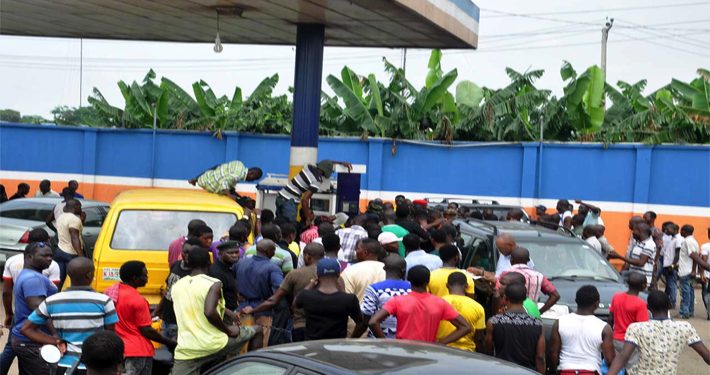Some residents of Ilorin have decried the state’s recent increase in petrol pump prices.
The residents, who also expressed unhappiness over hoarding the commodity by filling stations in the state capital, said the fuel price hike has unsettled their financial capacities and caused spiral inflation.
They prayed for the product to be made available and regular.
Peter Adekunle in Ilorin on Monday, the fuel price increase jolted him.
“We were just coming to terms with buying it at N180 around here, but now it has been increased again to N280, in some other places N250 per litre. Sometimes we sacrifice our feeding money just to buy fuel, either for our cars or to power our generating sets because electricity is also not stable,” Mr Adekunle explained.
He added, “What does the government want from the masses? There is no more consultation with the people before decisions and policies are made. No public vote or debate anymore, so you are forced to ask questions on governance.”
Another resident and commercial driver, Ahmed Yusuf, said, “It pains me that government will not see or hear our views. Does the government actually put what we feel into consideration? If they do, we will not be where we are today. Every day, people are complaining of hardship, yet it seems that the more we express our concern, the more things become unbearable.”
Mr Yusuf explained that petrol, kerosine and diesel “have become untouchable products. Our wives cannot cook with kerosene because it is expensive, and gas is also not affordable.”
“How, then, do we survive? Commodities and foodstuffs are inflated, and now the source of our livelihood is being threatened by the constant hike in price and the resultant hoarding and scarcity of fuel,” he explained. “The queues are back, we are buying little for so much, but we make little or no gains at the end of the day.”
According to a social analyst, Dipo Oluwatoyin, instability in oil prices and the incessant increase have a negative impact on the mental, economic and productive ability of individuals in the society.
“We all know that fuel seems to be the driving force of most economic activities in Nigeria. We all depend on fuel for transportation, agriculture and other production chains. So when fuel becomes scarce or is unaffordable, productions dwindle, markets begin to depreciate, and that is why we have inflation everywhere,” Mr Oluwatoyin stated.
He stressed that “people, companies, establishments are being forced to adapt suddenly to changes over a short period of time, which I can tell you is quite uncomfortable for the average citizen” and that “there is poverty,” making feeding to be a problem for the masses.
Mr Oluwatoyin pointed out that the more instability in the country’s economic policies, the more unstable people become mentally, socially and economically, which ultimately leads to the issues of insecurity, social vices and health issues “we experience today.”
He added, “I think the government needs to put the masses in mind when policies and decisions are being made. Independent marketers of petrol should be monitored and regulated by reliable agency of government.
“They increase prices and they are always the first to shut their stations and hoard fuel, which causes scarcity and hardship for the people.”
Some fuel stations in the Ilorin metropolis were shut, while some dispensed at N250 and N280 per litre, even though their metres read N180 per litre.
(NAN)






